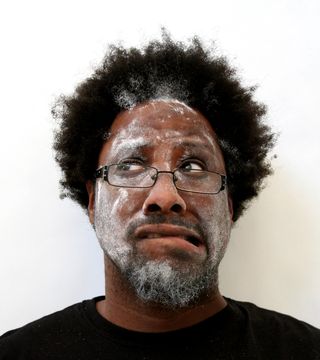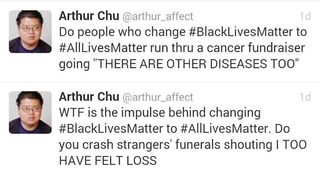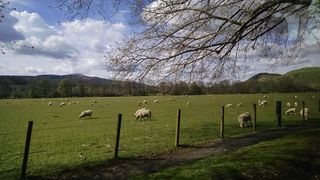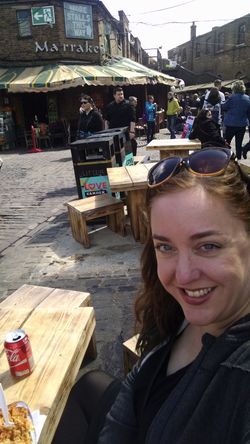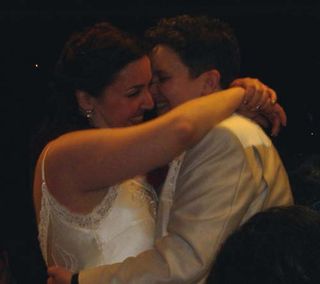
Archives for June 2015
Why Saying “All Lives Matter” Sounds Racist
#BlackLivesMatter — that’s the conversation we’re having. The conversation is not #AllLivesMatter. I'm talking to you, my kind, liberal (and conservative!) friends who vote and eat college-educated meat and read the New York Times and believe gays should get married if they want to register at Target for a waffle iron they'll never use. You are against racism. I know. Let's talk about why #AllLivesMatter is just wrong.
(If you left an “all lives matter” message on my Facebook, thank you, friend. I know what you meant by it, and I think you’re darling. Yes. We want all beings to be happy, safe, and well. People of all races, genders, and sexual orientations suffer harassment and deserve better. But we shouldn’t co-opt this particular message, and here’s why it can be dangerous and inherently racist to do so.)
The BlackLivesMatter movement was started by three queer black women. Their message was simple—
#BlackLivesMatter doesn’t mean your life isn’t important–it means that Black lives, which are seen as without value within White supremacy, are important to your liberation…We’re not saying Black lives are more important than other lives, or that other lives are not criminalized and oppressed in various ways. We remain in active solidarity with all oppressed people who are fighting for their liberation and we know that our destinies are intertwined.
When we drop the word Black, we further the racist legacy of erasing black lives, something our country has always done.
The conversation we are having this week is about the 9 killed in Charleston, South Carolina, at Emmanuel AME Church in a terrorist attack (defined as: the use of violence to intimidate a segment of a population in furtherance of a social objective). Edited to add: Even Fox news agrees.
The conversation last week was about unarmed black children being held down forcefully when found to be in the wrong space. The conversation before that was about Tamir Rice. And before that, Michael Brown. And before that, Eric Garner. I won't go on, but of course, I could.
“There are black people in America dying because of racism.” W. Kamau Bell, a comedian who lives in Oakland, said this six months ago.
In January, you may have heard, he was book shopping while his wife and child ate at a sidewalk cafe with some friends in Elmwood. He stopped by to show them the book he’d bought. He’s black. The women he was talking to were white. Let's make sure we understand this:
He was a black man standing next to a table full of white women, talking to them.
Then employees of the restaurant told him to scram. To git.
He was told to leave the property because he was a black man, harassing the white ladies. They tried to chase him away from his wife.
He was recently on This American Life, talking about the community meeting he organized after this happened (worth a listen, or fascinating transcript here).
At that meeting, UC Berkeley professor Nikki Jones asked everyone to think of the world in terms of black space and white space. She said that people have ideas about black space: that it’s poor, that it’s the ghetto. Just about everywhere else is white space.
And this: Black people have a special burden to bear when they are in white space—black people have to prove they are worthy of BEING in white space.
How rare it is, she said, for white people to have that experience, of going into black space.
Here’s where I puffed up with pride. I wanted to raise my hand, even though I was listening in my car. Me, call on me! I live in one of those so-called "bad" neighborhoods, a black neighborhood! When we moved here, people stared at us when we walked the dogs. They still do. I can count on two hands the times I’ve seen other white people walking in my neighborhood in the past nine years.
That means I understood it more. By dint of where I live, I was—automatically—more sympathetic to the plight of black America because I saw more, witnessed more.
But I was shaken to my core when Bell pointed out the obvious fact that I can leave whenever I want.
I have a white passport.
I had never thought this clearly about it.
I live in a black neighborhood in Oakland, sure. This means precisely nothing. The fact remains that I can dive headfirst into white space (the grocery store, the sushi restaurant, the library) AT ANY MOMENT without anything to prove. I can go just about anywhere I want. Without being stopped, without being harassed, without being in danger. I belong.
WHITE LIVES ALREADY MATTER.
In our country, black people have to prove they deserve to exist in white space (and a hell of a lot of people don’t think they do).
If you’ve ever given a black man on the sidewalk an extra once-over just to make sure he’s not doing anything hinky, you’re guilty of this. I’m guilty of this. We’re guilty of this because, as Americans, racism is our legacy.
I used to think I was better than most at understanding racism, at being sensitive to it, at not letting it anywhere near me. Let’s face it, we all tend to think we’re better than others—it’s a human failing, and maybe it’s what keeps us reaching to do better. But the real, painful truth is that I’m just accidentally privileged, by virtue of my skin color.
Kadijah Means, an 18-year-old Oakland social activist said at Bell's community meeting: "Focus less on color blindness, because honestly, you're not going to get a gold star for that. Be more color competent."
That was my sin–thinking I could somehow become color blind if I just tried hard enough. Turns out I need more competence in the subject. So I implore you: Please think before you try to erase the word Black from this conversation. It NEEDS to be said.
My mother was so proud she'd been witness to and a part of the Civil Rights movement. "We Shall Overcome" was, literally, one of the very first songs I ever learned from her. She would hate that I had to write this today, more than fifty years later.
Black people are dying because of racism. Today.
This has to change. We are the ones who have to effect that change.
UPDATE:
I just watched a Ted talk by Jay Smooth, and I think he gets it right when he says that our own pockets of racism are not like tonsils, which you either have or don't have*. It's more like plaque on our teeth, something we all have to work on. We don't stop brushing our teeth because we're already clean. I HATE it when someone tells me I have spinach in my teeth, but I appreciate being told to go brush, you know?
Video is here, in case anyone would like to watch him speak way more eloquently than I could.
UPDATE TO THE UPDATE:
Yeah, I do keep adding to this post. This update is because people are asking me what they can possibly do. Jon Stewart broke it down in a way that resonated so hard with me my whole body hurt:
"I honestly have nothing other than just sadness once again that we have to peer into the…the nexus of a just gaping racial wound that will not heal, yet we pretend doesn’t exist."
What can we do? I sure as hell don't know any better than anyone else, but ignoring it isn't working. Talking? Maybe that's what we have right now. Speaking with respect, but without fear. Speaking even when we're scared. Over on Facebook, I'm losing friends and readers. And you know what? For the first time ever, I paid to boost a post, because I'm not sure I'll ever write a blog as important as this one again. (I could only afford $30 from the budget. That'll probably get me somewhere into the Facebook algorithm, but not far. Share the post, if you'd like. That's a free boost, and a kind way for you to help.)
- Talk. When your coworker says something about mental illness and how we'll never know what really went through the shooter's mind, say the truth: That Dylann Roof was a grown-ass racist man who used lynch language ("they're raping our women") in order to justify killing six black women and three black men.
- Speak up. When your friend says something disparaging about Section 8 housing, say, "Wow. I bet you didn't know that sounded racist." (It's not about lower income families. It's about what those lower income families look like. Your friend will deny this. That's okay.)
- Speak up some more. When your mom says how she won't park in a certain area of town, say, "Wow. I bet you didn't know that sounded racist." (It's not about crime in that area. It's about how she feels being white with a nice car in that area. Your mom will deny this. That's okay.)
- Be educated. Watch some more Jay Smooth. Start with this short video on Systemic Racism. (The median wealth for a single white women is $41,000. For a single black woman, it's $120. READ THAT AGAIN because you will think you read it wrong. WHAT THE HELL IS THAT?)
- Be ready to talk. Be ready do admit you might not know your ass from your elbow, but that you're willing to learn. Be willing to admit you were wrong.
- Stand up for someone else. If you're in the restaurant where W. Kamau Bell is chased away from his white wife because of a "misunderstanding" about race, make it really freaking clear that it's not okay.
- Be ready to fight. The system we live in is wrong. As Jon Stewart pointed out, black people drive on streets named for confederate generals who died to keep black people from having the right to drive on those same streets. The confederate flag flies over the South Carolina State House and the state governor doesn't have the authority to change that. Our legacy, our heritage is wrong. (Update from Allison: It USED to fly over the state house but we successfully fought to have it removed 15 years ago. At that time it was MOVED to a memorial located IN FRONT OF the state house. This is still unacceptable, of course, and many South Carolinians are working to have it completely removed from the state house grounds.)
Black people are dying because of racism. Today.
This has to change. We are the ones who have to effect that change.
PS – Comments welcome. Disagreements and conversations welcome. Rude language or a fists-flying attitude will get your comment/tweet/FB response whomp-blocked, so don't bother.
* Some of you might remember that my tonsils keep growing back every time I get them taken out. Sadly, the analogy doesn't stretch that far.
Tic Tack Talk
Craft of Writing
Dear Writer-Readers of the Blog,
I use a little trick for creating rounded characters that might come in handy to you at some point. This is not their inner motivation — that comes from the inside, way down deep. Crafting character arc is a whole different and much more complicated post (let me know if you'd like that one sometime — I draw most heavily from John Truby's and Michael Hague's techniques, which might give you a starting point).
This technique, on the other hand, is something that gets me a little deeper into my characters after I've worked out their character arcs and interior/exterior motivations. It's something that's super useful if I come up with it ahead of time, instead of being 75% into a first draft and realizing I still don't have a good handle on my people yet. (In that case, I go back and pepper this stuff in during edits.)
Tic Tack Talk
Tic: A repeated physical action used to show inner emotion.
Everyone has one. I've had characters that create made-up words under stress (phloobts! stamzik!) and characters who tap their teeth. Their tic can be pushing their glasses higher every minute or two or forgetting to say the last few words of their sentences. The tic should be both physical (observable) and unconscious, and it should say something about the character that she herself isn't keen on revealing to anyone else.
Tack: A concrete object used as a place to store a character's emotion.
It's a touchstone. Let's call it a tack because it's just fun to say tic tack talk. It's normally (but not necessarily) small and it's always meaningful. It could totally be a tack (like, if the main character sat on a tack left on her seat by her annoying but adorable brother who died later that day from a random but wildly-vicious rabid-squirrel attack), but I bet it won't actually be a tack. That would be a pointy, possibly dangerous touchstone (ooh, now I want to use one in a book someday). I have used coins and pebbles and pieces of beach glass and knitting and jewelry. They're clutched and treasured until, as the character's arc resolves, they are needed less.
Talk: The character's diction, taken directly from his passion.
This one is super obvious but it took me a while to figure out how effective this shortcut to point-of-view voice is. Here's a grossly-exaggerated example: If your hero is a fisherman, he won't see pink and white clouds at sunset, he'll see a school of salmon and whitefish in the sky. His lover's skin won't be clammy after she's poisoned (go with me here), it'll feel like the inside of a wet wader. When he finds out he's going to jail for poisoning her, he'll feel like he's swallowing rusty fish hooks, one after another. And when he cries in his death-row cell, he can still taste the sea.
As readers, we love these three things, all of them. We eat 'em up as long as they're not too overdone, something that's completely possible, see previous paragraph. Sure, we can see them for the devices they are, but something in our brains, that simple part that wants to sit around the campfire and listen to a good yarn, still loves them.
Take your main characters (who are already rich and round, who are already going places in their arc) and give 'em each one of these. Let me know if it helps.
The Magic of Travel
BAY AREA BOOK FESTIVAL
I'll be speaking this Sunday at 1pm on banishing your inner editor with Chris Baty and Grant Faulkner at the East Bay Media Center in Berkeley. Info here. (Free! You should come!)
CATCHING UP
There's so much to say and catch you up on, and I've hit that overwhelmed point at which I don't know HOW to catch you up on anything at all, and so, very happily, I'm letting that go. I'll give you a few highlights.
I went to Edinburgh to write.
Who gets to say that? I DO. *boggles and blinks*
Sometimes (more often than I ever would have thought) I get to say amazing wonderful sentences like that, and it feels–literally–magical. When I was a little girl, I'd dream about traveling the world, writing as I went. I didn't really think it would happen, though. Who thinks that?
But now? I've written all over the world. While traveling, I like best to write in hotel breakfast rooms (after breakfast is done) because there's nothing interesting to look at and no one bothers you. The thing I've found, though, is usually I do much less writing that I hope to when I travel. I was on deadline during this last trip, and I did do quite a bit of writing. In Edinburgh, I was with four other writers, and we were there to write (we also wandered and ate and found castles, but mostly we were there to work). So we wrote.
Lisa, Gigi, Em and I writing at the Elephant House, where Rowling wrote the first Harry Potter book
But I had this one day slated as an all-day writing binge. It was on my schedule. It was my only full day in London, and I was by myself, and I had this romantic vision of myself moving slowly from cafe to cafe all day, working on my book as I went.
Well. I woke up in London and thought to myself, SELF, YOU ARE IN LONDON. GO LOND. So I did. One never regrets wandering Camden Market, or people-watching, or finding a boat and just getting on it without knowing (or caring) where it was going after it cruised the canals (I hadn't even known London had canals! Or that the boat would let me off in Paddington! I was practically the bear!).
I could have worked on my book that day. But I didn't.
Usually, when you're traveling, your environs are new and sparkly. They're fascinating. You want to watch, to participate, to wander. What you do not want to do is put your head down and go back into the world that you made up. You know that world intimately. You can visit that anytime. Go be where you are. Take that home with you.
I've found the magic is in coming home. It's not something you have to really think about. You don't have to write up your findings and assimilate your new knowledge about Bloomsbury walkways into your everyday life. You don't have to suddenly write a book about a ruined castle or the fighting couple who ran the pub or the gorgeous French barista who sang along with the classical music in the cafe. You don't have to use any of those things at all. That stuff is just in you, and you'll use it when you need it. It'll be there.
*Y'all, my packing was a thing of beauty. One half-sized carryon, one purse.I kept coming up with things (need a charger? Here's an extra! Clothesline, here you go!) and Lisa kept saying, "WHERE? WHERE DID YOU PACK THAT?" and there is nothing more satisfying for an obsessed underpacker to hear, ever.
